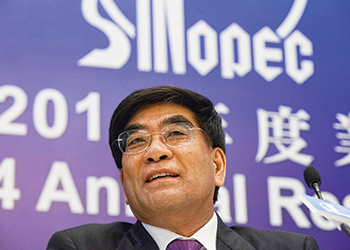
 Sinopec ... cutting refinery runs
Sinopec ... cutting refinery runs
China’s dominant state oil firms were forced to make rare cuts in refinery throughput in the first two months of this year versus a year ago, as independent oil processors ramped up production and boosted fuel sales, industry officials said.
Beijing last year began allowing independent refineries to import crude oil for the first time, letting them vie against the state-owned refining giants for a bigger slice of the world’s second-largest fuel market, and setting off record exports of diesel as well.
State refiners, mainly Sinopec Corp and PetroChina, recorded about a 2.5 per cent drop in their combined crude runs over January-February compared with the same two months last year, according to a state oil company official with access to detailed government data.
State refiners, which together meet more than 80 per cent of China’s fuel demand, have for years been maximising throughput as a priority for operational efficiency and rarely cut runs, especially on a year-on-year basis.
Independent refineries – nicknamed "teapots" due to their relatively small scale and less sophisticated equipment – however have raised their crude run rates by nearly 30 per cent from the same period in 2015, the state company official said.
The official did not give detailed volumes and declined to be named because of company policy.
"A diversified competitive market structure has taken shape in China’s refining industry," Zhong Fuliang, a vice president of Sinopec’s trading arm Unipec, told an oil seminar in Beijing, referring to the emergence of the teapot refiners as a growing force of crude buyers and oil marketers.
Sinopec and PetroChina did not immediately respond to requests for comment about the lower crude throughput.
China’s loadings of West African crude oil were on track to hit their highest barrel-per-day level in 19 months in April, according to a Reuters survey, mainly due to strong demand from the teapot refiners.








































































